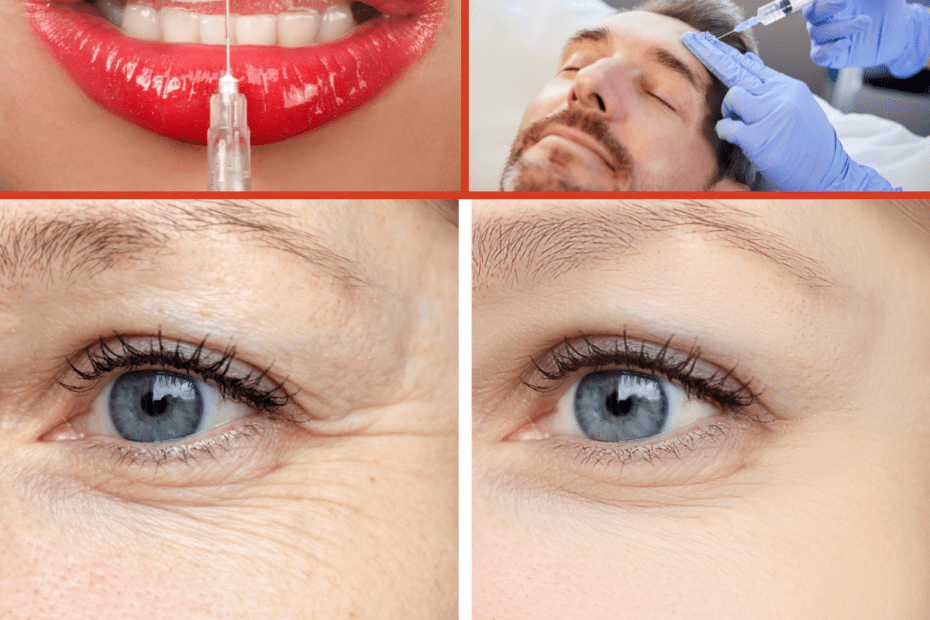Botox injections are used to reduce wrinkles around the eyes, forehead, nose, mouth, chin, neck, chest, and upper back. Botox is most commonly injected into these areas because they tend to be the first parts of the face people notice when looking at someone’s face.
While botox has been proven effective in reducing lines and wrinkles, it cannot completely eliminate them. It may take several months before you see results after receiving an injection. The effects of botox last between 3-6 months depending on the area treated.
Botulin toxin, sold commercially under the name Botox, is an exceptionally potent neurotoxin that has found a spread of remarkable uses in modern medicine. it’s also the foremost popular nonsurgical medical cosmetic treatment within the UK and USA.
Botox - the research
Researchers discovered within the 1950s that injecting overactive muscles with minute quantities of neurotoxin A decreased muscle activity by blocking the release of acetylcholine at the myoneural junction, thereby rendering the muscle unable to contract for a period of 4 to six months.
Alan Scott, a San Francisco ophthalmologist, first applied tiny doses of the toxin during a medicinal sense to treat crossed eyes and uncontrollable blinking, but a partner was needed to realize regulatory approval to plug his discovery as a drug.
Allergan, Inc., a tiny low drug company that focused on prescription eye therapies and get in touch with lens products, bought the rights to the drug in 1988 and quickly received FDA approval in 1989. Allergan renamed the drug Botox.
FDA Approval
The cosmetic benefits of Botox were quickly realized when the frown lines between the eyebrows seemed to soften following treatment for ocular muscle disorders. The increased potential of Botox as a cosmetic treatment led to clinical trials and subsequent FDA approval in April 2002.
Botox treatment migraines
Currently, Botox is finding enormous additional potential in several therapeutic areas including the treatment of migraine headaches, cervical dystonia (a neuromuscular disorder involving the top and neck), blepharospasm (involuntary contraction of the attention muscles), and severe primary axillary hyperhidrosis (excessive sweating).
Additional uses of Neurotoxin
Other uses of neurotoxin A that are widely known but not approved by the FDA include enuresis, anal fissure, spastic disorders related to injury or disease of the central systema nervosum including trauma, stroke, MS, or spastic paralysis and focal dystonias affecting the limbs, face, jaw, or vocal cords.
Treatment and prevention of chronic headaches and chronic musculoskeletal pain are emerging uses for neurotoxin A.
Skin treatment
As an alternative to Botox, anti-aging creams are heavily marketed and advertised on television, with the promise of looking younger and therefore the reduction in visible wrinkles on the skin
Botox before and after
Traditionally, they need been targeted towards women, but products specifically targeting men are now common. this alteration could also be thanks to the very fact that a lot of societies in recent years have seen an increased specialize in young looks, including in men.
Botox is for women only?
Some men report that looking younger makes it easier to urge an honest job.
There are a variety of cosmetic ‘treatments for the looks of wrinkles on the skin like cosmetic surgery and botox injections. one among the marketed advantages of anti-aging cream is that it’s an alternative to those more extreme cosmetic treatments.
Critics take the view that the manufacturers of those products feed on the fears of girls, and the advertisements abuse science by claiming that their products are scientifically proven to figure.
It’s said that the ‘scientific data’ is predicated on the perception of girls who have tried the merchandise, and are asked whether or not they think they appear younger. These are the hallmarks of a placebo.
However, it’s plausible that a number of anti-aging products could have a rejuvenating effect, as promised.
Botox side effects: Caution
The best way to determine whether botox is right for your needs is to talk to your doctor. He/she will evaluate your skin condition and discuss all treatment options available to you. However, the consequences of most anti-aging products likely depend on their concentration and mode of application, making their effects less certain.
- Pain, swelling, or bruising at the injection site.
- Headache or flu-like symptoms.
- Droopy eyelid or cockeyed eyebrows.
- Crooked smile or drooling.
- Eye dryness or excessive tearing.
Botox and Oral Health
Many oral health problems stem from stress and tense muscles, which can cause pain in the neck, head, and jaw, and also damage natural teeth. Botox helps by relaxing those tense muscles in the face and mouth so that you can have a pain-free smile.
Botox has been used to correct parafunctional clenching, temporomandibular disorder, trismus (difficulty opening), and the headaches that accompany these conditions.

Your article helped me a lot. what do you think? I want to share your article to my website
Wellcome!!!
Thanks for sharing. I read many of your blog posts, cool, your blog is very good.
Healthy skin is a reflection of overall wellness. It’s important to take care of your skin, not just for its appearance, but also for its health.